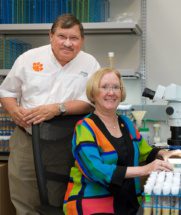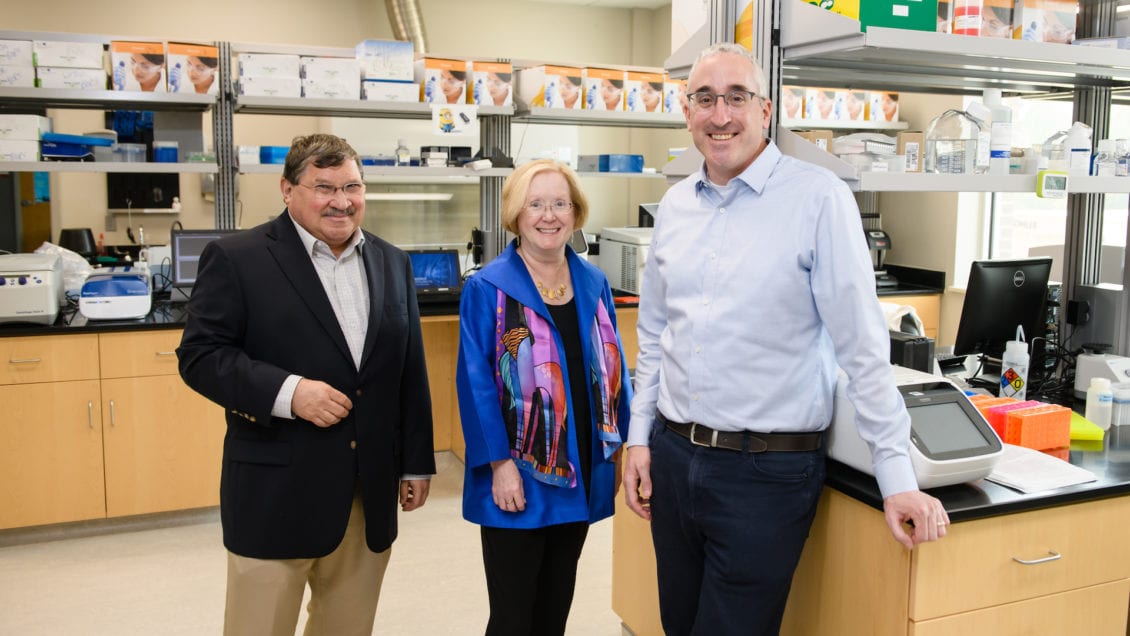The Center of Biomedical Research Excellence (COBRE) in Human Genetics will host leading experts in the genetics of rare and common human diseases during its first symposium at the Arts Center of Greenwood in Greenwood, South Carolina, on Friday.
The COBRE in Human Genetics is a collaboration between the Clemson University Center for Human Genetics (CHG) and the Greenwood Genetic Center (GGC). The GGC provides clinical services to more than 5,000 patients annually and diagnostic laboratory, testing, educational programs, and research in medical genetics. Since it opened in 2018, the CHG has collaborated closely with the GGC.
In April 2021, the National Institutes of Health (NIH) awarded Clemson $10.6 million to establish its first COBRE specifically focused on human genetics.

“The annual COBRE symposium in human genetics provides an opportunity for COBRE-affiliated faculty to network with renowned scientists in human genetics while showcasing Clemson as a rapidly emerging leader in the field,” says COBRE in Human Gentics Co-Principal Investigator and Provost’s Distinguished Professor Robert Anholt.
This year’s symposium will be attended by 78 registrants and will include 20 poster presentations.
Plenary lectures will be presented by Trudy Mackay, co-principal investigator and program director of the COBRE in Human Genetics and one of the world’s leading authorities on the genetics of complex traits; Clement Chow, from the University of Utah, who focuses on understanding the role of genetic variation on disease outcomes to advance precision medicine; Monica Justice, program head in genetics and genome biology at The Hospital for Sick Children in Toronto, Ontario, and an expert on Rett syndrome; Marcelo Nobrega, from the University of Chicago, who studies regulatory variants that give rise to human diseases; and Nancy Cox, the director of the Vanderbilt Genetics Institute whose research focuses on large-scale integration of genomics with other “-omics” data and biobank and electronic medical records data.
Increase competitiveness of research
COBRE grants are designed to increase the competitiveness of research of early-career faculty that will allow them to become independent investigators with substantial research funding for their labs, Mackay said. The COBRE in Human Genetics has many mentorship-type activities, including the symposium, which is an annual event.
The COBRE in Human Genetics has four core research projects, each led by an early-stage investigator.
Andrei Alexandrov, assistant professor of genetics and biochemistry at Clemson, analyzes human nuclear long non-coding RNAs to identify potential targets for new treatments for cancer and viral diseases.
Heather Flanagan-Steet, director of functional studies at the Greenwood Genetic Center, studies genetic mutations that cause neurological and cognitive impairment, skeletal abnormalities and early infant death.
Miriam Konkel, assistant professor of genetics and biochemistry at Clemson, works to understand why and how transposable elements, sometimes called “jumping genes,” can move around the human genome and alter gene expression.
Fabio Morgante, assistant professor of genetics and biochemistry at Clemson, will analyze genetic data from 500,000 people as part of a project to develop statistical models that can predict cardiovascular disease with high accuracy, taking into account environmental effects and genetic variation among individual of different ethnicities.
Pilot projects
Since initiation of the COBRE in Human Genetics, pilot projects have been started by Zhana Duren, assistant professor in the Department of Genetics and Biochemistry; David Feliciano, associate professor in the Department of Biological Sciences; Jessica Larsen, dean’s assistant professor, Department of Chemical and Biomolecular Engineering and Department of Bioengineering; Xinyi Li, assistant professor, School of Mathematical and Statistical Sciences; and Liangjiang Wang, associate professor in the Department of Genetics and Biochemistry.
“The COBRE in Human Genetics has sponsored research in two colleges and four departments at Clemson University to date, and I look forward to the integration of human genetics in more Clemson departments in the future,” said Mackay, who is also the director of the CHG and Self Family Endowed Chair of Human Genetics.
The College of Science pursues excellence in scientific discovery, learning, and engagement that is both locally relevant and globally impactful. The life, physical, and mathematical sciences converge to tackle some of tomorrow’s scientific challenges, and our faculty are preparing the next generation of leading scientists. The College of Science offers high-impact transformational experiences such as research, internships, and study abroad to help prepare our graduates for top industries, graduate programs, and health professions. clemson.edu/science
The Center for Human Genetics is part of Clemson University’s College of Science and is housed in Self Regional Hall, a state-of-the-art research facility located on the campus of the Greenwood (S.C.) Genetic Center. The CHG’s research focuses on genomic, computational, and comparative genetic approaches to gain insights into genetic and environmental risk factors for human diseases.
Get in touch and we will connect you with the author or another expert.
Or email us at news@clemson.edu

